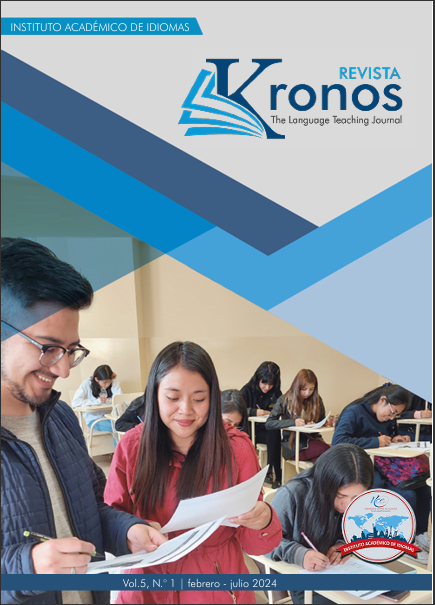Do Online Classes Really Contribute to Support EFL Learning?
Teachers’ Perspectives
DOI:
https://doi.org/10.29166/kronos.v5i1.6126Keywords:
Learning, teachers, perspectives, online classroomsAbstract
Online classes or virtual classes have become an essential aspect of modern education and have changed the perspective of language learning, especially in the context of English as a foreign language (EFL). This study addresses the following question: Do online classes really support the learning of English as a foreign language? As virtual class rooms become more popular for both learners and educators, the effectiveness of the classes has shown some gaps in the teaching-learning process. In this regard, the main objective of this study is to investigate teachers' perspectives on the success of online teaching in relation to EFL learning. Therefore, this study is concerned with identifying the strengths and challenges that teachers perceive in virtual spaces. The methodology used for the research involves a mixed method with a questionnaire addressed to 6 teachers, 4 work in a public school and 2 in primary education, both located in the south of Quito, thus, the structured questionnaire will allow to clearly know the teachers' views on the impact of virtu al platforms and corroborate their perspective with the results of the study. The outcomes highlight the adaptability of online classes for EFL teaching and e-learning as a valid present and future option. Furthermore, this study will provide relevant information on how to correct and improve teaching in virtual environments However, concerns about possi ble loss of student engagement have emerged as key issues.
Downloads
References
-Atmojo, A. E. P., & Nugroho, A. (2020). EFL classes must go online! Teaching activities and challenges during COVID-19 pandemic in Indonesia. Register Journal, 13(1), 49-76. https://doi.org/10.18326/rgt.v13i1.49-76 DOI: https://doi.org/10.18326/rgt.v13i1.49-76
-Barrett, B. (2010). Virtual teaching and strategies: Transitioning from teaching traditional classes to online classes. Contemporary Issues in Education Research (CIER), 3(12), 17-20. https://doi.org/10.19030/cier.v3i12.919 DOI: https://doi.org/10.19030/cier.v3i12.919
-Baticulon, R. E., Sy, J. J., Alberto, N. R. I., Baron, M. B. C., Mabulay, R. E. C., Rizada, L. G. T., ... & Reyes, J. C. B. (2021). Barriers to online learning in the time of COVID-19: A national survey of medical students in the Philippines. Medical science educator, 31(1), 615-626. https://doi.org/10.1007/s40670-021-01231-z DOI: https://doi.org/10.1007/s40670-021-01231-z
-Camargo, C. P., Tempski, P. Z., Busnardo, F. F., Martins, M. D. A., & Gemperli, R. (2020). Online learning and COVID-19: a meta-synthesis analysis. Clinics, 75. https://doi.org/10.6061/clinics/2020/e2286 DOI: https://doi.org/10.6061/clinics/2020/e2286
-Castro, M. D. B., & Tumibay, G. M. (2021). A literature review: efficacy of online learning courses for higher education institution using meta-analysis. Education and Information Technologies, 26, 1367-1385. https://doi.org/10.1007/s10639-019-10027-z DOI: https://doi.org/10.1007/s10639-019-10027-z
-Chandra, A. (2021). The use of virtual-motivation to engage students on lessons in online teaching. JELITA, 2(1), 1-10. Retrieved from
https://jurnal.stkipmb.ac.id/index.php/jelita/article/view/67
-Derakhshan, A., Kruk, M., Mehdizadeh, M., & Pawlak, M. (2021). Boredom in online classes in the Iranian EFL context: Sources and solutions. System, 101 (1), 102556.
https://doi.org/10.1016/j.system.2021.102556 DOI: https://doi.org/10.1016/j.system.2021.102556
-Dumford, A. D., & Miller, A. L. (2018). Online learning in higher education: exploring advantages and disadvantages for engagement. Journal of computing in higher education, 30 (1), 452-465. https://doi.org/10.1007/s12528-018-9179-z DOI: https://doi.org/10.1007/s12528-018-9179-z
-Hoi, S. C., Sahoo, D., Lu, J., & Zhao, P. (2021). Online learning: A comprehensive survey. Neurocomputing, 459(1), 249-289.
https://doi.org/10.1016/j.neucom.2021.04.112 DOI: https://doi.org/10.1016/j.neucom.2021.04.112
-Junus, K., Santoso, H. B., Putra, P. O. H., Gandhi, A., & Siswantining, T. (2021). Lecturer readiness for online classes during the pandemic: A survey research. Education sciences, 11(3), 139. https://doi.org/10.3390/educsci11030139 DOI: https://doi.org/10.3390/educsci11030139
-Khan, M. A., Kamal, T., Illiyan, A., & Asif, M. (2021). School students’ perception and challenges towards online classes during COVID-19 pandemic in India: An econometric analysis. Sustainability, 13(9), 4786. https://doi.org/10.3390/su13094786 DOI: https://doi.org/10.3390/su13094786
-Korkmaz, G., & Toraman, Ç. (2020). Are we ready for the post-COVID-19 educational practice? An investigation into what educators think as to online learning. International Journal of Technology in Education and Science, 4(4), 293-309. https://files.eric.ed.gov/fulltext/EJ1271308.pdf DOI: https://doi.org/10.46328/ijtes.v4i4.110
-Madi Albogami, M. (2022). Do online classes help EFL learners improve their English language skills? A qualitative study at a Saudi university. Arab World English Journal (AWEJ) 2nd Special Issue on Covid, 19. http://dx.doi.org/10.2139/ssrn.4036761 DOI: https://doi.org/10.2139/ssrn.4036761
-Means, B., Toyama, Y., Murphy, R., & Baki, M. (2013). The effectiveness of online and blended learning: A meta-analysis of the empirical literature. Teachers college record, 115(3), 1-47. https://doi.org/10.1177/016146811311500307 DOI: https://doi.org/10.1177/016146811311500307
-Murphy, E., & Rodríguez-Manzanares, M. A. (2009). Teachers’ perspectives on motivation in high-school distance education. International Journal of E-Learning & Distance Education/Revue internationale du e-learning et la formation à distance, 23(3), 1-24. Retrieved from https://ijede.ca/index.php/jde/article/view/602
-Nartiningrum, N., & Nugroho, A. (2021). English teachers’ perspectives on challenges, suggestions, and materials of online teaching amidst the global pandemic. IJEE (Indonesian Journal of English Education), 1(1), 108-126. DOI: https://doi.org/10.15408/ijee.v1i1.17886
http://doi.org/10.15408/ijee.v8i1.17886
-Pandey, D., Ogunmola, G. A., Enbeyle, W., Abdullahi, M., Pandey, B. K., & Pramanik, S. (2021). COVID-19: A framework for effective delivering of online classes during lockdown. Human Arenas, 5(1), 1-15. https://doi.org/10.1007/s42087-020-00175-x DOI: https://doi.org/10.1007/s42087-020-00175-x
-Rachmah, N. (2020). Effectiveness of Online vs Offline classes for EFL Classroom: a study case in a higher education. Journal of English Teaching, Applied Linguistics and Literatures (JETALL), 3(1), 19-26. http://dx.doi.org/10.20527/jetall.v3i1.7703 DOI: https://doi.org/10.20527/jetall.v3i1.7703
-Russell, V. (2020). Language anxiety and the online learner. Foreign Language Annals, 53(2), 338-352. https://doi.org/10.1111/flan.12461 DOI: https://doi.org/10.1111/flan.12461
-Taghizadeh, M., & Amirkhani, S. (2022). Pre-service EFL teachers’ conceptions and strategy use in managing online classes. System, 104 (1), 102671.
https://doi.org/10.1016/j.system.2021.102671 DOI: https://doi.org/10.1016/j.system.2021.102671
-Yusuf, B. N., & Ahmad, J. (2020). Are we prepared enough? A case study of challenges in online learning in a private higher learning institution during the Covid-19 outbreaks. Advances in Social Sciences Research Journal, 7(5), 205-212.
https://doi.org/10.14738/assrj.75.8211 DOI: https://doi.org/10.14738/assrj.75.8211
-Zamora-Antuñano, M. A., Rodríguez-Reséndiz, J., Cruz-Pérez, M. A., Rodríguez Reséndíz, H., Paredes-García, W. J., & Díaz, J. A. G. (2021). Teachers’ perception in selecting virtual learning platforms: A case of Mexican higher education during the COVID-19 crisis. Sustainability, 14(1), 195. https://doi.org/10.3390/su14010195 DOI: https://doi.org/10.3390/su14010195
Published
How to Cite
Issue
Section
License
Copyright (c) 2024 Rogger Silva Herrera

This work is licensed under a Creative Commons Attribution-NonCommercial-ShareAlike 4.0 International License.












